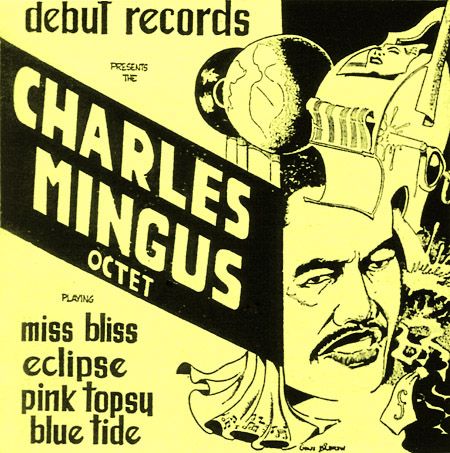
An early release on Charles Mingus and Max Roach's Debut label.
Today Charles Mingus is revered by jazz historians and fans as an important figure in jazz history, whose work as a leader and composer forged a creatively unique path through the mid-20th century music scene. But at the start of the 1950s, as Mingus approached his 30th birthday, he was known primarily as a talented bassist and member of vibraphonist Red Norvo’s successful trio. In 1952 he and drummer Max Roach founded their own record label—a bold and innovative move for the two artists that would further both of their careers and document the development of other significant up-and-coming musicians as well.
Bassist Charles Mingus performing his composition “Haitian Fight Song” live in 1955, with Eddie Bert on trombone, George Barrow on tenor sax, Mal Waldron on piano, and Willie Jones on drums--from the box set Charles Mingus: The Complete Debut Recordings.
In 1952 bassist Charles Mingus and Max Roach, with the help of their partners and a cigar salesman whose son loved jazz, began the Debut record label—one of the first and most significant labels ever founded and run by jazz musicians. Woody Herman, Duke Ellington, Dizzy Gillespie and others had undertaken similar ventures, but none of them yielded anything like the impressive run of recordings that Debut turned out during its five years of existence, extensively documenting Mingus’ work at a key point in his artistic evolution, as well as early efforts by trumpeters Thad Jones and Kenny Dorham, pianist Paul Bley, and other up-and-coming musicians. For Mingus, who had recently left the successful Red Norvo Trio and spent a brief hiatus from jazz working at the post office, it was a way of presenting his own music in the manner he desired. Although he’d been composing for years, his reputation rested almost entirely on his proficiency as a bassist, and his Debut output formed one of the first cornerstones of his eventual legacy as an important jazz artist. The label’s motto was “The Latest and Greatest in Jazz,” and as jazz writer Dan Morgenstern noted, its releases ran a stylistic gamut from straightahead to experimental. I’ll start off with a recording that Mingus had already made in 1951 with pianist Spaulding Givens that became one of Debut’s earliest releases--“Body and Soul,” on Night Lights:
Jackie Paris singing “Portrait,” with Lee Konitz on alto sax, Phyllis Pinkerton on piano, George Koutzen on cello, Al Levitt on drums, and Charles Mingus on bass, recorded for Mingus’ Debut label in 1952. Mingus and pianist Spaulding Givens before that in 1951 doing “Body And Soul”.
Running a record label involved a tremendous amount of work—finding and contacting distributors, corresponding with jazz DJs and writers, manufacturing and shipping records, and collecting payment for those records. Mingus’ wife Celia handled many of these responsibilities, and musicians such as pianist Mal Waldron pitched in as well. All of this labor made possible Mingus’ mission of presenting “the latest and greatest in jazz,” which reflected his interest in influences ranging from Duke Ellington to classical music. Debut gave Mingus the opportunity to record modernistic music that he’d been composing from the 1940s on, and to showcase young artists with similar aims. I’ll start off this next set with music from a 1953 Debut session that features a Mingus-led octet performing his composition “Miss Bliss,” on Night Lights:
Pianist Paul Bley performing his composition “Spontanenous Combustion,” with Charles Mingus on bass and Art Blakey on drums, recorded for the Debut label in 1953. Before that, a nonet led by Mingus performing his composition “Miss Bliss,” also recorded in 1953.
That same year one of the most notable recordings made for the Debut label came from an all-star bebop concert held at Toronto’s Massey Hall, featuring pianist Bud Powell, saxophonist Charlie Parker, trumpeter Dizzy Gillespie, and Debut co-owners Mingus and Roach. As Dan Morgenstern points out, Debut benefitted from being launched at the beginning of the album era, and the Massey Hall concert was a prime example, initially contained on two 10-inch LPs that could accommodate extended live performances that would not have fit on a 78. A couple of interesting side notes—Mingus was not happy with the recorded quality of his bass parts and dubbed in new versions of them, while Parker, under contract to Norman Granz’s Verve label at the time, was credited on the Debut releases as “Charlie Chan.” The albums garnered good sales for Debut and provided one of the final documents of Parker and Gillespie working together. Here’s the rhyhm section followed by the full quintet, live at Massey Hall in 1953, on Night Lights:
The Quintet at Massey Hall in 1953—saxophonist Charlie Parker, trumpeter Dizzy Gillespie, pianist Bud Powell, bassist Charles Mingus, and drummer Max Roach performing “A Night In Tunisia.” The rhythm section alone before that doing “Embraceable You” at the same concert…all of that music released on Charles Mingus and Max Roach’s Debut record label.
I’m featuring music from bassist and composer Charles Mingus on this edition of Night Lights, focusing on the Debut record label that he and drummer Max Roach co-founded in the mid-1950s—one of the earliest examples of what would come to be known in the music business as DIY, or “do it yourself.” While the label showcased much of Mingus’ work as a leader, he also appeared as a sideman on many of its releases, including first recordings by artists who would go on to wider fame such as trumpeter Thad Jones, and others who would remain interesting obscure figues in the history of jazz, such as pianist John Dennis. Their contributions expanded the range and depth of Debut’s offerings, though they’re often overshadowed in Debut retrospectives by the Massey Hall concert and albums put out under Mingus’ name. Here’s John Dennis and “Ensenada,” on Night Lights:
Trumpeter Thad Jones performing “I Can’t Get Started,” with John Dennis on piano, Charles Mingus on bass, and Max Roach on drums, recorded for Mingus and Roach’s Debut label in 1955. The same group before that, minus Jones, doing Dennis’ composition “Ensenada.”
Debut ceased making new recordings after 1957, and its discography eventually came under the ownership of Fantasy Records. Running a label and working as musicians at the same time proved to be too cumbersome for Mingus and Roach, and Mingus’ marriage to Celia, who had shouldered much of Debut’s administrative burden, ended around this time as well. But the label’s legacy and worth had already been established. Max Roach later told jazz writer Ira Gitler that “Debut Records served as a springboard for both Mingus and myself and some of the other artists to sign with major labels. And Debut recorded some of the most interesting people, musicians who are now really just legends in their own time.” In his notes to a 1997 box-set compilation of Debut’s recordings, Dan Morgenstern said that “Debut stands alone as a musician-operated jazz label of more than footnote consequence in the annals of this great music.” I’ll close with some live recordings that Mingus made at New York City’s Café Bohemia in 1955, subsequently released on Debut—here’s “Work Song,” on Night Lights:
Jazz scholar Krin Gabbard on Mingus and Debut Records in Gabbard's Mingus biography, Better Git It In Your Soul:
When Debut Records got going in 1951, Mingus recorded an intriguing group of musicians. While various peers in the jazz world were destroying themselves with drugs, Mingus had lived past the dangerous age of twenty-seven and become an entrepreneur. But as Eric Porter points out, he could not have kept Debut going without the consistent and conscientious contributions of his second wife, Celia. Many of the Debut recordings featured players who were less committed to bebop than was the fashion or who were engaged in composing unusual music. In spite of Mingus’s commitment to freeing black artists from servitude to record companies, many of the artists he recorded were white, including Paul Bley, Teo Macero, Jimmy Knepper, Lee Konitz, and the singer Jackie Paris. After all, Mingus did compose a piece called “Meditations on Integration.”
During the Debut years, Mingus regularly sat in with musicians who were recording as leaders. He went out on a limb to record bebop bassist Oscar Pettiford with the French hornist Julius Watkins. He also experimented with a group that included four trombonists. J. J. Johnson and Kai Winding had already made a few recordings together as sidemen, so Mingus invited them to join trombonists Willie Dennis and Benny Green for a Debut LP. This may have been the beginning of a partnership for Johnson and Winding as leaders. “Jay and Kai” had substantial success after they recorded with Savoy Records. And they were wise enough to hire Mingus to play bass on their first sessions as co-leaders.
Previously on Night Lights:
Live At Cafe Bohemia: Hardbop In The Heart Of Greenwich Village
It's Time! Max Roach In The 1960s
Outtakes: More Debut Recordings Featuring Charles Mingus









